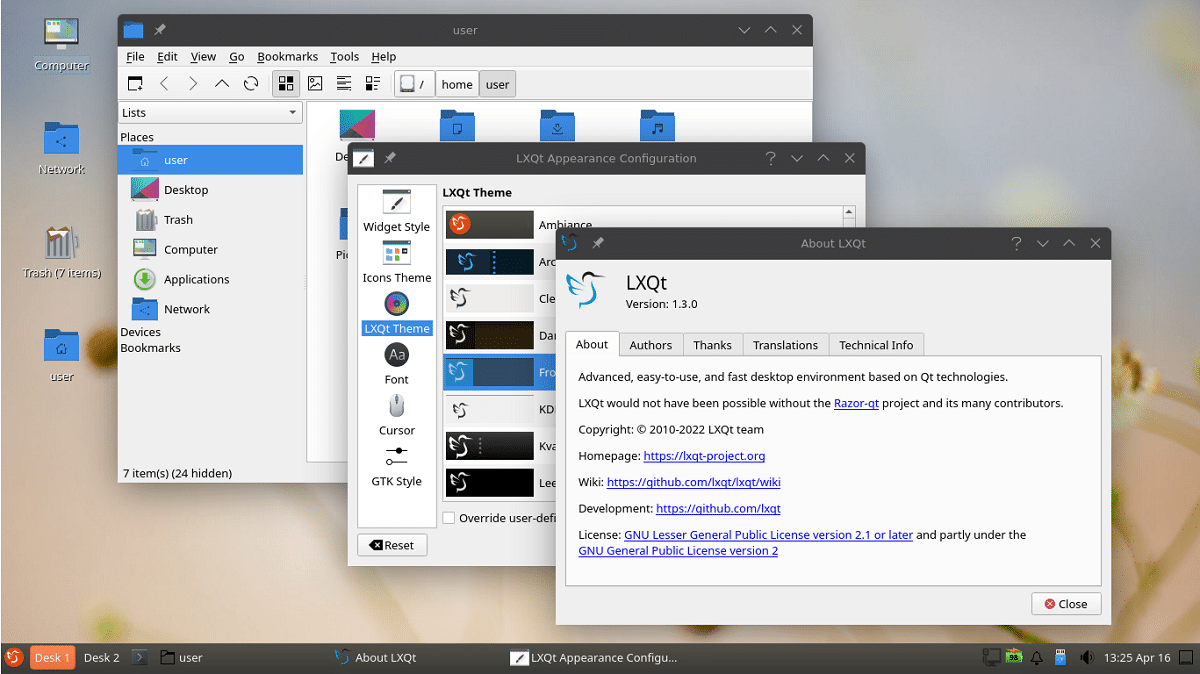
LXQt is a free and open source desktop environment for Linux.
The release of the new version of the desktop environment was recently announced «LXQt 1.3″ version still based on the latest LTS version of the QT framework, i.e. Qt 5.15 and although the jump to QT 6 was expected, it is not yet ready, but far from that this new version comes with important improvements.
LXQt is positioned as a lightweight, modular, fast and convenient continuation from the development of the Razor-qt and LXDE desktops, which has absorbed the best features of both.
For those who are unaware of LXQt, they should know that this eIt's a desktop environment result of the merger between the LXDE and Razor-qt projects and which is positioned as an excellent option for low-resource teams or those who prefer to save resourcess, as the biggest improvement to LXQt is it provides a lightweight desktop and much more control than LXDE.
Main new features of LXQt 1.3
The new version that is presented LXQt 1.3 arrives with improvements in the file manager (PCManFM-Qt) in all display modes, The ability to turn off smooth scrolling has been implemented, plus handling of zero-size files that are no longer treated as text files has been improved. Fixed an issue with displaying items on the desktop after a settings change and now the default name for created files is “New File”.
Another of the changes that stands out in the new version is in the QTerminal terminal emulator in which support for working on has been improved protocol-based environments Wayland (Selection of the correct context menu position has been ensured), as well as fixed issues when switching between dark and light themes.
In addition to this, the utility lxqt-sudo adds the ability to use doas, An analogue of the OpenBSD project's sudo utility, detection of the window manager and system tray in the session manager has been improved.
In the panel, by default, the plugin build to display the DOM tree is enabled and in the LXImage image viewer, the app icon has been replaced with a vector image in SVG format.
Like previous releases, LXQt 1.3 continues to be based on the Qt 5.15 branch, for which official updates are released only under a commercial license, while the KDE project generates unofficial updates.
It is worth mentioning that work continues on porting to Qt 6, so the implementation of this is not yet available, as the developers have decided so far it cannot be offered to users until the stabilization of the KDE Frameworks 6 libraries is complete.
Of the other changes that stand out:
- Qt6 support was started (and can be used in WIP builds) but could not be released due to the lack of a stable KF6.
- Other changes can be found in the changelogs of the LibFM-Qt/PCManFM-Qt components
- Prevented desktop items from shaking on setting changes.
- Fixed opening non-executable files that have executable types.
"New file" is used as the default name for new files (especially after GLib 2.75.1, which no longer handles empty text/plain files)
To know more details about the release of this new version, you can check them In the following link.
If you are interested in downloading the source code and compiling yourself, you should know that it is hosted on GitHub and it comes under the GPL 2.0+ and LGPL 2.1+ licenses.
As for the compilations of this environment, these are already within most Linux distributions, for example for Ubuntu (LXQt is offered by default in Lubuntu), Arch Linux, Fedora, openSUSE, Mageia, Debian, FreeBSD, ROSA and ALT Linux.